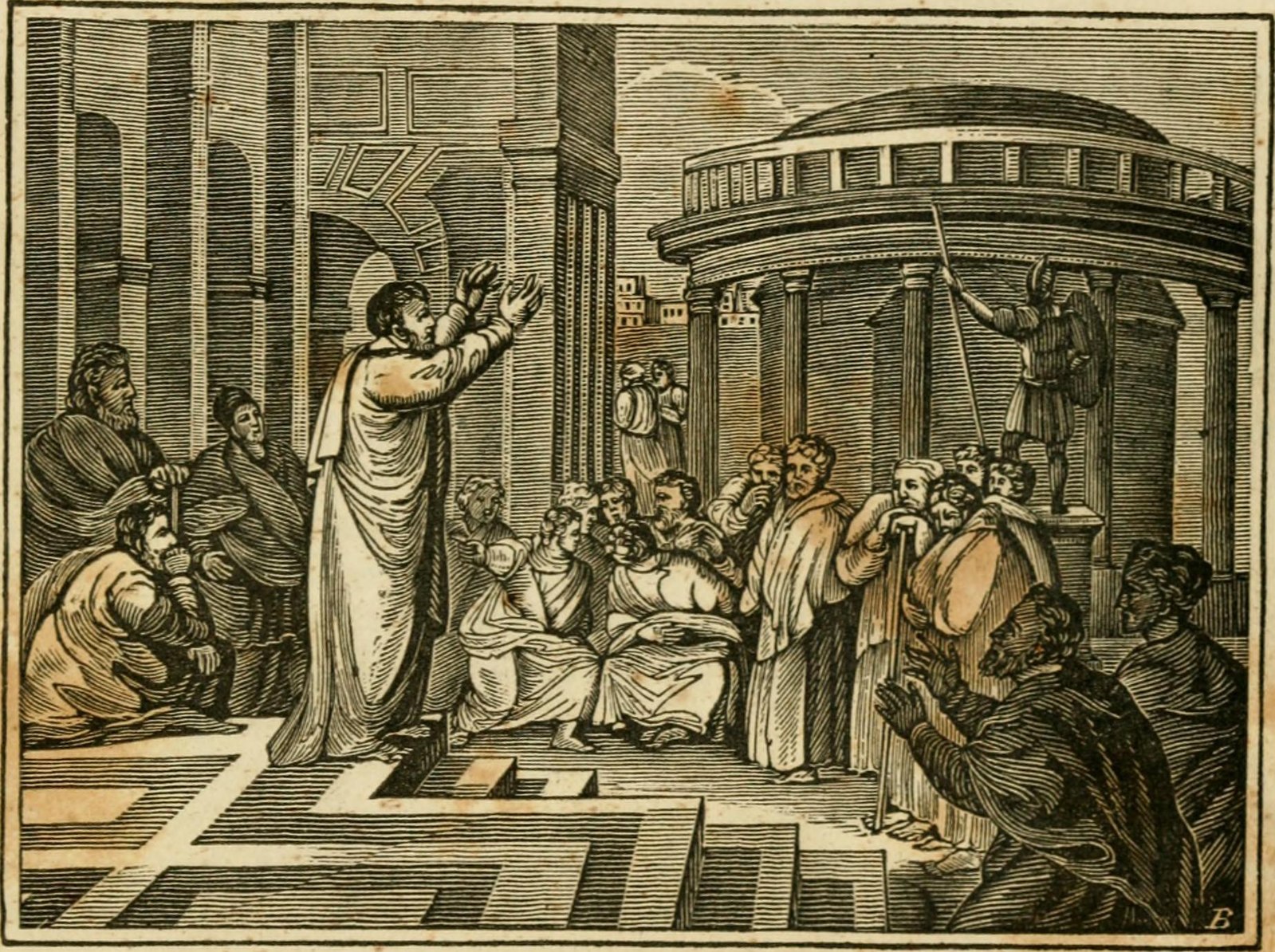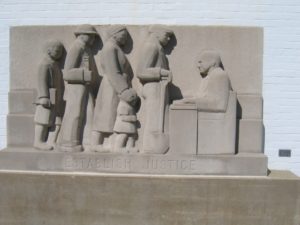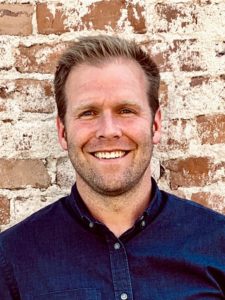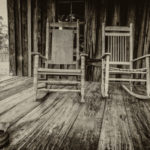Caldwell, ID. Ken Myers is the founder, producer, and host of the Mars Hill Audio Journal, which mailed its first interviews to subscribers as cassette tapes in 1993. My own subscription started in 2006, back in the CD era. Every two months, subscribers are treated to a two-hour compilation of Myers’s interviews with subjects discussing everything from agrarianism, automation, and Arthurian legends to laughter, liberty, and localism to vainglory, vampires, and the Vanderbilt Agrarians. Each issue is built on a series of interviews, but it is also woven together into an oral essay, with Myers tacking his way through unifying themes and the insights or blind spots of his interview subjects. Andrew Ferguson’s description of MHA is apt: “Imagine NPR if NPR were as intelligent as NPR programmers think it is.”
Intelligent as it is, however, what increasingly stands out in the Journal is Myers’s commitment to careful and attentive reading and listening, as well as his comfort with silence and dedication to classical and sacred music. Each issue of the journal might be considered a potent antidote to the “Noise” that is Screwtape’s ally in distracting souls from perceiving and sensing the true, the good, and the beautiful. Though his insights into the interviews are as perceptive as those of his subjects in them, Myers is clearly a reader and listener first, well-versed in the craft of drawing out the deep waters of his subjects’ hearts and minds.
This month’s Brass Spittoon marks Ken Myers’s first visit to Front Porch Republic, but he is no stranger. The next issue of the Journal will feature FPR editor-in-chief Jeff Bilbro, and the current issue features Local Culture editor Jason Peters. The previous issue featured FPR president Mark Mitchell, and many other FPR contributors can be heard in past issues as well.
Stewart: Like you, I spent my childhood in Maryland but have since settled in another place. My wife and I chose her hometown and we are both content here, but there is still a sense of forsaken responsibility and loss that I feel whenever we return to Maryland on visits. As a fellow Wendell Berry reader who admires his descriptions of the joys and trials of sticking to places built on commitments that span more than one generation, were you ever conflicted in your choice to settle outside of your hometown?
Myers: I grew up in Greenbelt, Maryland, a D.C. suburb with an interesting history. It was part of a New Deal effort that combined progressive social engineering and quasi-socialist economic ideas. Intended principally as a working- and lower-middle-class community, the residences were modest housing which were cooperatively owned, as was the local grocery store, the town’s newspaper, and other local institutions. Art deco architecture, a WPA statue in the town square, and bas-relief on the elementary school that echoed socialist realism conveyed reminders of 1930s optimism and utopianism.
The 1939 film The City, a classic documentary from the era, included footage which was shot in Greenbelt, emphasizing, as I recall, the pedestrian-friendly quality of the place. I remember that it was a great place for bike riding. In retrospect, I realize that in many ways it anticipated concerns later expressed by the New Urbanists. By the time I was in college, with a driver’s license and friends in other suburban neighborhoods, I appreciated the extent to which the Greenbelt of my childhood was more like a small town—even in the 1950s and 60s—than other suburbs.
One other advantage that Greenbelt had was a sprawling agricultural space on its border, a 6,500 acre USDA research center that we called the Beltsville farms. I spent many hours in the farms while in junior and senior high school bike-riding and bird-watching.
When, in 1964, the Capital Beltway was completed, I-495 bisected Greenbelt, and in some ways began a transformation of the place. It still retains more sense of being a place than many D.C. suburbs. But now as then, very few people who live in Greenbelt work in Greenbelt; it is still in many ways only a bedroom community, even if it suffers a bit less from the sense of placelessness that most of the D.C. area fosters.
My parents moved to Greenbelt in 1959, when I was in first grade, from an apartment in nearby Mt. Rainier, Maryland. But I was born at northern Virginia’s Ft. Belvoir, as my dad was then doing cryptological work for the Army Security Agency. In 1952, six months before I was born, the National Security Agency was formed, and my dad eventually (as a civilian) transferred from the A.S.A. to the N.S.A. In 1957, the N.S.A. moved its headquarters to Ft. Meade, Maryland, a location between Washington and Baltimore, and deemed far enough away from the nation’s capital to survive a nuclear attack. Greenbelt was only 20 minutes south.
My family’s move to Greenbelt was thus as much a commuter’s decision as anything else. My parents had no history in the place, no burgeoning sympathies with proto-new Urbanism. Their parents and siblings and cousins and aunts and uncles were back in central and southern Pennsylvania, where ancestors dating well back into the 18th century are buried. Their move away from the places of their people to the D.C. suburbs was a decision made by the Army. And my father’s career kept him in the area, eventually taking us to a place with no history prior to its birth from the womb of New Deal idealism.
So I grew up in a neo-place, the identity of which was strongly shaped by the interests of the national government. To add to that vague (and unremarked) sense of displacement, most of my uncles, aunts, and cousins were missionaries, in Africa, India, and Vietnam. I only got to play with those cousins every 4 or 5 years when they were home on furlough. Their ties to the Pennsylvania of their ancestors was severed even more firmly than mine, and a few of them, while still American citizens, have never even lived long in the U.S.
I grew up without a strong sense of regional identity. As an undergraduate at the University of Maryland, most of my friends were from New Jersey. My interest in and involvement with the arts and media fostered a cosmopolitan attitude, and my religious convictions were certainly more concerned with matters of the spirit than of the body. Only much later, as I wrestled with questions about the various deformations encouraged by modernity, did I come to realize how a lack of concern for place and the ordering of places was an expression of the broader devaluation of the body which characterizes modern gnosticism. By that time, my wife and I had—in search of employment—already moved away from the D.C. suburbs, many of which had themselves suffered displacing transformations. I doubt that anyone I grew up with or went to school with still lives in Greenbelt. It may have been where I grew up, but it lacks the quality of a “hometown.”
So, am I—a sympathizer with localists of various stripes—conflicted? Yes, but I also realize that some places—and some careers—have a greater capacity for sustaining intergenerational community than others. My father moved from Pennsylvania to Virginia at the Army’s pleasure. My son, whose wife is an Army doctor, now lives (with my four grand-children!) in Texas, again serving Uncle Sam. And of course, most careers—whether corporate, academic, of professional—involve the same requirements of mobility.
During the early years of my career at NPR, in the late 1970s and early 1980s, I still lived in the D.C. suburbs, but worked in the city with colleagues who were all from somewhere else. When I lost that job, we relocated to Philadelphia. My training and abilities were fairly specialized, and despite the size of the city, I couldn’t find a job in D.C. that fit what I could do. While working at a Christian magazine and then a theological journal, the idea for a project that grew into Mars Hill Audio began to take shape. We thought then about moving back to Maryland, but realized that the cost of living there and the economic realities of launching a new non-profit organization made it imprudent for us to live anywhere near my “hometown.” Plus, my reading of Wendell Berry and others had inspired an interest in living outside of a city or suburb. So we ended up moving to Powhatan County, west of Richmond, Virginia. We had friends in the area, and it was about as close to my and my wife’s parents as my grandparents were from my own family when growing up. At the time, Powhatan County had no stop lights, no convenience stores, no fast food, and no ATMs. We had 4 acres of land on which we developed a sizable garden, and I was involved in some local civic life, but we were still newcomers.
Once Mars Hill Audio was launched (literally in our garage), friends from Richmond and Charlottesville were enthusiastic observers. But my neighbors really had no idea what my work—and our life—was about. We were in that place, but not of that place. Four years later, we moved west, to Greene County, north of Charlottesville. That move was prompted by the presence in Charlottesville of a sizable number of thoughtful Christians—some scholars, some students, some attentive laypeople—who understood the need for Christians to develop greater awareness and wisdom about navigating our cultural moment.
Stewart: How has your location in Quinque, Virginia, just outside of Charlottesville, shaped Mars Hill Audio? Do you imagine that it would be a significantly different institution if you had started Mars Hill in New York, D.C., or Chicago—or Boise?
Myers: First of all, having worked in two large cities, I can’t imagine doing what I do now in such a setting. In short, I think I would find the distractions of urban life too debilitating for the contemplative posture my work requires. I can’t guess how much time it would require to raise the extra money necessary to maintain even the modest operation we have here—fundraising can be a big distraction from the work the funds are intended to support. Meanwhile, my studio and office space are 300 feet from my house, on our 11-acre wooded lot. The trees, birds, mammals, and reptiles I meet while walking to and from work (when I’m not working in the library in my basement) play a big role in my imagining what’s wrong with modernity.
When I worked in the city, I paid no attention to the height of the sun in the sky, the direction from which the wind was coming, or seasonal changes in the quality of light. The only birds I heard were starlings, house sparrows, and domestic pigeons, creatures who have adapted to urban settings and whose lives (and songs) seem duller thereby. Living and working where I do, I think I’m better able to comprehend the critiques of modernity in books like Romano Guardini’s Letters from Lake Como or George Parkin Grant’s Technology and Empire. Ironically (or tragically?), I’m not sure that I would understand the losses of various forms of modern gnosticism and the forces of dismemberment if I had stayed in Greenbelt. Such understanding is more than mastering theories. So I think my decision in 1988 to get out of the city to reflect on the city’s plight was a good one. I’m not saying it would have been impossible to come to such recognitions, only that I wasn’t equipped to do so.
I mentioned earlier the presence nearby of a critical mass of thoughtful Christians a presence which has also been an important part of the formation of my thinking and that of the people who’ve worked with me. That could probably be replicated in the cities you mentioned, but without as many trees.
Stewart: You started Mars Hill Audio just before Mark Noll published his Scandal of the Evangelical Mind in 1994. While it should be noted that Mars Hill has consciously sought to be rooted in the broader Christian tradition, it is still identifiable as one attempt to address Noll’s criticism. What are some of the most promising trends you have observed over the last three decades in your conversations and debates with those Christians who have constituted the evangelical mind? Which trends seem most destructive?
Myers: I think that there is a growing number of evangelicals who are willing to look beyond the evangelical tradition for wisdom about the challenges we face. Some are looking to pre-Reformation sources, some to resources in Orthodoxy, some in the work of post-Reformation Roman Catholic thinkers. But in doing so, many have found it inadequate to self-identify as evangelicals, or at least as mere evangelicals. So perhaps the most encouraging thing I’ve seen is the willingness of people from evangelical backgrounds to recognize that you don’t have to be evangelical to be a serious Christian.
For decades, I have been uneasy with the designation. I read Thomas Howard’s Evangelical Is Not Enough when it first came out in 1984, and have continued to deepen my conviction that too many doctrines and practices are made optional in the way the term is typically used.
Someone once commented that the word “evangelical” and the word “parachurch” are virtually synonymous, suggesting that one of the characteristics of evangelicalism is too low a view of the Church. I have come to appreciate—through the work of thinkers as various as Lesslie Newbigin, Stanley Hauerwas, Peter Leithart, Oliver O’Donovan, and David L. Schindler—how the secularizing tendencies of modernity are not just a matter of marginalizing religion, but of privatizing the work and effect of redemption and rendering the Church into an agency for the support of individual Christians.
Not long ago, I went back and re-read Noll’s book, and was disappointed with the extent to which he focused on the question of scholarship. While I am deeply interested in the vitality of Christian scholarship of all stripes, I am even more concerned about the state of the minds of non-scholars. The work of scholars should serve Christians—evangelicals and others—who are in business, education, journalism, law, politics, or other vocations. Those people are the ones Harry Blamires was writing about in The Christian Mind.
I think that it is more likely than it was 50 years ago for evangelical laypeople to take an interest in cultural issues because they think their faith encourages them to. But I don’t think that it is any more likely that they will think theologically about such matters. I think that for many, personal faith is a source of motivation, but the Faith is not a source of relevant knowledge. Thinking about cultural matters because we’re commanded to love our neighbors—that’s easy. But thinking about cultural matters in light of the Trinity or Pentecost or the Ascension or the Eucharist—that’s not very common. So the dualism that separates faith and reason may have been overcome by many evangelical scholars. But I think very few laypeople are striving to think about culture in a theological way. And the result is a kind of Moralistic Therapeutic Deism when it comes to cultural matters.
For example, how many evangelicals take kindly to the claims that Joel Salatin makes—which are ultimately theological claims—about how we should raise our food? My hunch is that while there may be many evangelical scholars who are sympathetic to the mission of Polyface Farms, most laypeople would be suspicious. Their suspicion may be theologically grounded, but I don’t think they are armed with enough theology; I think their arsenal may be limited by the limits imposed by evangelicalism’s origins as a modern movement.
Stewart: When I was first introduced to the broader world of Christian scholarship that you have both guided and explored through Mars Hill, the insights that I most valued were pre-political in orientation, or at least I received them that way. In the age of Trump and Twitter, however, partisanship seems to have become more prominent. I don’t necessarily blame evangelicals who look at the evangelical mind as simply the equivalent of the evangelical left, and are thus suspicious of some of these theological developments. What do you make of that assessment? How might we reframe some of these discussions so that people recognize them as primarily theological rather than partisan?
Myers: First, I think that emphasizing partisanship in the present moment distracts everyone from recognizing the systemic nature of our various conflicts and tribulations, and from understanding those problems in a deeply, adequately theological way. If the evangelical mind has made partisanship seem more central of late, this is because there is a heightened sense of crisis. Things seem to be falling apart; the center doesn’t seem to be holding. I think that that perception is sound. But I think it’s fruitless to make the further assumption that picking one of the sides in whatever conflict is raging will be adequate to address those problems. The configuration of the “sides” and the definition of the “problems” are themselves sources of the dissolution and fracturing.
I think you’re right that we must re-frame discussions to make them more theological. But there is no non-jarring or convenient way to do that. It takes a lot of time and reflection to achieve the metanoia of a paradigm shift. One tool that I’ve been using to try to re-order my own thinking is to interrogate the conventional framework of understanding any contested issue (e.g., racism, gender identity, GMOs, suburban sprawl, etc., etc.). To what extent is that framework merely an expression or extension of M.T.D., i.e., Moralistic, Therapeutic Deism? And then I think about how the framework of diagnosis and treatment would be different within the context of what I’ve somewhat playfully designated M.E.T.: Metaphysical, Eschatological Trinitarianism. I came up with that summary because I think the conventional framework of the current parties fails to ask essential theological questions: about what things are, about how all things should be understood in light of God’s purposes in history (centered in the building up of the Church), and about how our understanding of things is configured in light of (among other extra-Deist events) the Incarnation, the Resurrection, the Ascension, and Pentecost.
Now, about the evangelical mind: without going into a lot of detail, I think that the current temptation toward increasingly rancorous partisanship among evangelicals is due in part to a tendency to think about politics and political responsibility within the limits of the M.T.D. mindset. They have accepted the prohibitions of liberalism about bringing theology to bear on public matters. But if that prohibition is itself a principal source of our confusion and chaos, we are not loving our neighbors by honoring it. Of course, we need deeper and broader theological resources than have been typically fostered within evangelical institutions. And cultivating those resources toward maturity will take longer than the next election cycle. Remember what T. S. Eliot counseled in 1939: “The fact that a problem will certainly take a long time to solve, and that it will demand the attention of many minds for several generations, is no justification for postponing the study. And, in times of emergency, it may prove in the long run that the problems we have postponed or ignored, rather than those we have failed to attack successfully, will return to plague us. Our difficulties of the moment must always be dealt with somehow: but our permanent difficulties are difficulties of every moment.”
Stewart: I’m assuming that Mars Hill has rarely been described as a tech start-up, but it was born in a garage with something of a technological innovation. Even as Mars Hill has continued to carefully adapt to new technologies, the corrosive effects of screens and social media have been a recurring theme in your interviews. What are your observations on these changes and how they have shaped your production decisions, the journal itself, and listeners’ responses to it?
Myers: Well, I kind of invented the podcast. Before there were iPods. So I am not opposed to technological innovation. What I am opposed to is the “technopolistic” tendency to fail to give adequate attention to the ends pursued by the use of technologies when implementing them. Jacques Ellul said somewhere that one of the characteristics of a technological society is its preoccupation with means while ignoring ends. And the more captivating the means are, the more bells and whistles they feature, the easier it is to be distracted away from consideration of ends.
I’ve thought a lot about how the experience of the medium shapes the reception of the “content.” Media ecologist Marshall McLuhan once observed: “Our conventional response to all media, namely that it is how they are used that counts, is the numb stance of the technological idiot. For the ‘content’ of a medium is like the juicy piece of meat carried by the burglar to distract the watchdog of the mind.”
For instance, when we developed an app to distribute our “content,” I refused to allow people to “like” any of the interviews and for us to share the number of “likes” with the universe. I thought about asking a dozen really smart and perceptive people to regularly share their “likes” with our listeners, but that’s what blogs are for.
One rule of thumb I’ve had for use of media is that it should encourage private reflection and face-to-face conversation. The most important technological tool in whatever device our listeners use is a pause button. The second is a rewind button. We do have a share button, but I’ve wondered if it should only be activated when someone has listened all the way through an interview and had a chance to think about it. I worry that we share things before they’ve really become ours to share. (I know I’m guilty of that).
As to conversation, there’s a lot of research to suggest that many habits of mediated communication diminish the capacity for immediate—and loving—communication. From the beginning, I’ve tried to provide a model for loving conversations (although I’m usually not face-to-face with my guests). I’ve come to appreciate—thanks largely to Oliver O’Donovan—the centrality of communication in all its forms to our social existence. I’d already been persuaded that love is at the heart of our lives, as it is in the life of God as Trinity. Communication and community and common good: all these things are intertwined. So “communications media” need to be attentive to that kinship.
Stewart: Classical music has been central to the work of Mars Hill, both in your use of selections before and after interviews and through interviews with musicians or historians of music. How has this music shaped the Journal? How have listeners responded?
Myers: You saved the best question for last, which enables me to give my most alienating answer just before we quit. I think that the state of musical experience of most contemporary Christians and of Christian institutions (churches and schools, especially) is a sign of the depth of modernity’s corrupting effects in our lives.
I’ve done a lot of lecturing and writing about music for years, especially since my heart attack in 2011. Having survived a type of coronary event that has a 4% survival rate, I asked some hard questions about what I should be doing with a life given back to me. I concluded that I would spend more time thinking about what music is and how modernity had affected our understanding of music. I was baffled that many people assumed that music was somehow immune from the mistaken assumptions about how we relate to Creation and our Creator that affected every other aspect of life: our understanding and practices concerning food, farming, place, sex, marriage, family, history, language, reason, etc., etc. I know many people who would be unafraid to look askance at someone for having bad taste in beer or whiskey, or for preferring processed to fresh food, or Thomas Kinkade to Rembrandt. But questioning someone’s musical taste is insufferably offensive. Music is the site where emotivism—the assumption that all value judgments are only expressions of preference—has (if paradoxically) unassailable authority.
The claim that musical judgments are purely subjective is a very modern phenomenon, which doesn’t make it false, but does raise questions about its veracity, especially in light of other dubious modern assumptions about reality. From the time of the ancient Greeks until the late eighteenth century—which is, after all, a very long time—almost no one believed that musical meaning was purely subjective. As musicologist Julian Johnson has written, “To an earlier age, our contemporary idea of a complete relativism in musical judgment would have seemed nonsensical. One could no more make valid individual judgments about music than about science. Music was no more ‘a matter of taste’ than was the orbit of the planets or the physiology of the human body. From Plato to Helmholtz [1821-1894], music was understood to be based on natural laws, and its value was derived from its capacity to frame and elaborate these laws in musical form. Its success was no more a matter of subjective judgment than the laws themselves.”
The widespread denial that the form music takes reveals something about the nature of reality is a close relative to the claim that the form of human bodies is a meaningless biological fact. Modern people are typically as confused about music as they are about sex, and for the same reasons.
Back in 2014, I wrote the first in a series of columns in Touchstone magazine called “In Heavenly Harmony.” I wrote there:
To say that we should be deliberate and discerning regarding our musical habits—and the habits of our children and our communities—might be the most incendiary claim one can make in the current cultural climate. That should tell us something. It may be the case that countless courageous campaigns to confront the nihilism that is the logic of the postmodern West have been frustratingly impotent and ineffective precisely because we have not attended to the nature and power of music—to how music means, how its meaning takes up residence in our moral imaginations, and how we might honor and celebrate its telos more adequately.
So how have the music features on the Journal shaped the Journal more generally? Perhaps by reminding me of the failure of most cultural conservatives to recognize the depth of our captivity to modernity. And how have listeners responded? Some have been deeply appreciative, and asked to learn more. But my sense is that most listeners who are intrigued by the lessons learned from my guests about other disorders of modern culture regard my interest in music as a tangential preoccupation, a personal preference. I’m just glad we don’t have a dislike button on our app.
Image credits: Paul Preaching at Athens; Greenbelt Community Center Bas Relief.







2 comments
Heather Savage
I find Mr. Meyer’s discussion of classical music insufficient for addressing non-western/European music and temperament. Does he think these other musical traditions do not reflect natural law, or does he think that music traditions from around the world and explorations into older temperaments, and now micro-tonality, actually reflect more of the reality of a universe that is bigger with more sonic variety than we previously understood?
Grant
Dr. Stewart,
Thank you for this post. I hadn’t quite connected Mars Hill Audio and FPR in my mind before. I know of few scholars who have provided me with as many substantial paradigm shifts as Ken Myers.
Thanks!
Comments are closed.